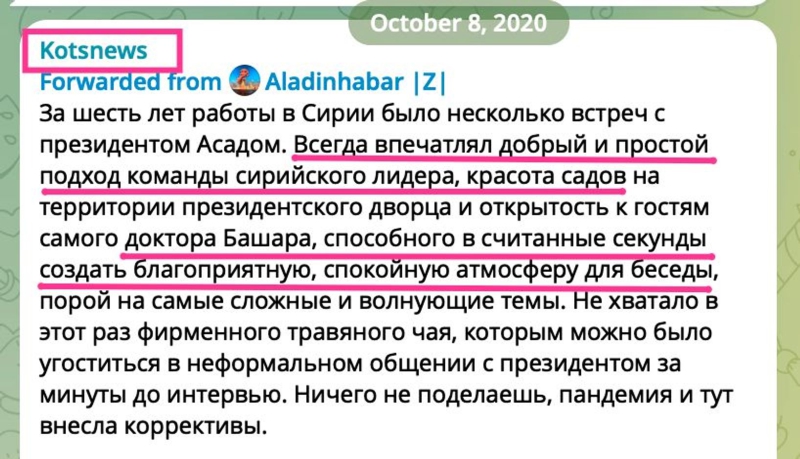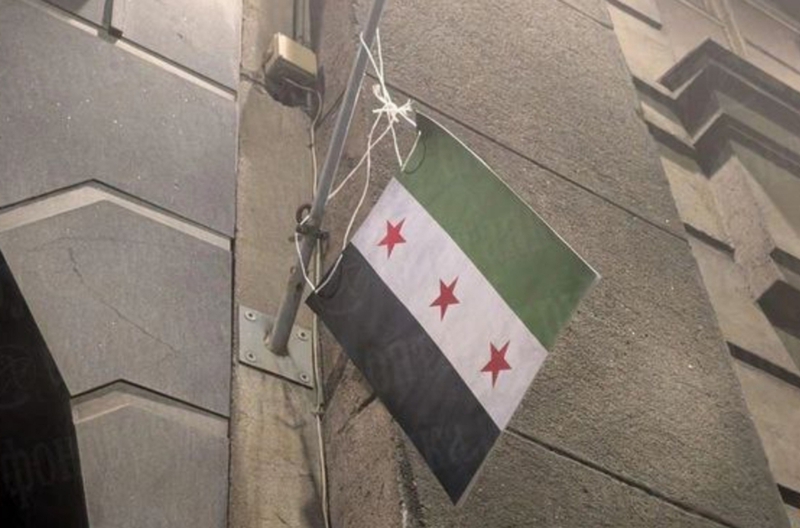A makeshift Syrian opposition flag on a string hung on the facade of the Syrian consulate in St. Petersburg on Dec. 8, replacing the removed flag of the Syrian Arab Republic used by the Assad regime. Photo: Fontanka.
The rapid advance of the Syrian rebels and the ousting of President Bashar al-Assad have dealt a serious blow to the mood of Russian propagandists. Some have gone into denial, dismissing Syria as somehow unimportant to Russia, while others openly argue that Russia was “screwed over,” drawing comparisons to the story of Cain and Abel. Pro-war Telegram channels are also criticizing the Russian military command for failing to withdraw its troops to safer positions in time, leaving them surrounded by rebel units.
Self-proclaimed “war correspondent” Alexander Kots shared a post criticizing how Assad’s army treated Russian journalists and soldiers — with disregard and a lack of respect. He no longer viewed Assad as a close partner to Russia but instead blamed him for driving Syrians into poverty, something Kots claims he has witnessed “all these years.”
According to Kots, Russia, whose military backing kept Assad in power, appeared to have simply maintained a presence in Syria — without provoking conflict or imposing Western values and democracy on Syrians, “unlike the United States.”
“I don’t feel sorry for the Syrian authorities. I remember all too well how, back in distant 2012, we, Russian journalists, were hassled at border control, with all our luggage turned inside out, cameras and photo equipment confiscated. […] Meanwhile, Western reporters were practically treated like royalty. […] This, among other things, reflected their attitude toward my country — condescending, with rolled eyes and a disgusted curl of the upper lip. […]
All these years, I watched as the metropolitan gloss gradually became covered in a layer of decay. How the smoke-filled offices with yellowing portraits of the Assads grew stifling with the increasing number of general stars on the epaulettes. How bread vanished from the stores, electricity from the sockets, and hope for a better life from people’s minds — life that became harder and harder. Not for the inhabitants of those smoke-filled offices, of course. […]
In the new Syrian setup, there will hardly be room for Russian bases in Tartus and Khmeimim. The situation is already being compared to the U.S. withdrawal from Afghanistan. But what’s common between them is only the rapid degradation of local government institutions. Unlike the U.S., we did not set out to build a new world in Syria, we did not impose Western values or plant democracy. We did not try to mold them into something new, working with both elites and civil society. We didn’t install our own presidents and government members. Perhaps that was a mistake…”
Back in October 2020, however, “war correspondent” Kots, while acting as an “observer,” shared very different views of Assad on his channel.

The sentences highlighted below read:
“I was always impressed by the kind and straightforward approach of the Syrian leader's team, the beauty of the gardens on the grounds of the presidential palace, and the openness of Dr. Bashar himself, who could, in a matter of seconds, create a pleasant, calm atmosphere for conversation, even on the most complex and pressing topics.”
In another post, propagandist Anastasia Kashevarova referenced the Bible and said Russia was “screwed over.”
“The first murder on Earth happened 30 kilometers from Damascus. Cain killed his brother Abel. The Third World War won’t start with Ukraine; the great upheavals will begin with Syria. Right now, it seems like the U.S., Turkey, and Israel have won, while Iran, Russia, and Syria have lost control. But everything is so fragile, and so many parties have interests there that the war is only heating up. People are celebrating the overthrow of Assad’s regime — an inept, short-sighted, and somewhat greedy politician, paralyzed into inaction. A soggy waffle, yet full of self-importance. But soon the aftertaste will come, and it will be bloody and terrifying—when the real division of resources, influence, power, and territories begins. […]
People haven’t learned the lesson that after every internal revolution, a war begins to enslave your country. The rulers haven’t learned it either, and they end up playing into the enemy’s hand. And as for the enemy — I mean the U.S. — everything is fine there. Even if their president were a dog, nothing would change. And the most humiliating thing is that world leaders would still meet with the dog, shake its paw, and bow before it while it pissed on them. The media in their countries would interpret this dog’s gesture as marking its favorite among all the world’s politicians.
It’s painful to watch Syria, but in the context of Russia. We see how we were screwed over and yet continue to glorify and grovel before Trump in our media. What a disgrace.”
Alexander Sladkov, a “war correspondent” for the state-run broadcaster VGTRK, lashed out at the level of Russian intelligence, which failed to warn Bashar al-Assad’s government about the upcoming rebel offensive. He also reflected on how the Russian public doesn’t seem to understand the purpose of Moscow's military presence in Syria.
“The Syrian failure. […] From a geopolitical and foreign economic perspective, our presence in Syria has never been fully explained to the Russian people. It would be easy to carry out a quick street poll in Russian cities and listen to what ordinary people answer when asked, ‘So, what is Syria’s global importance for Russia, anyway?’ I don’t think we’d hear anything coherent. No one will say, ‘It’s really valuable combat experience!’ after the questionable quality of [Russia’s] debut in the Special Military Operation.
I would ask myself the same question: do we even have intelligence services, do they work? And if they do, who’s ‘processing’ the results of their work? If this is some ‘masterstroke,’ a planned maneuver, then what’s happening with our troops in fallen Damascus, and what about the embassy?”
“War correspondent” Yuri Kotenok reposted a publication from the channel ATOMIC CHERRY, whose authors expressed outrage at Russian propaganda distorting reality.
“For many years, Russia’s media campaign about the operation in Syria aggressively promoted the narrative that Moscow was the key player on this military and political stage. The propaganda deliberately competed with the American depictions of the Iraq invasion, which were once broadcast on Russian television and etched into the minds of many domestic viewers as a model of superpower action. Don’t get me wrong — a media campaign as a tool isn’t inherently negative. Problems arise when it’s built entirely on fantasies, without any real foundation. […]
The media audience, having listened to stories of cosmic-scale successes for so long, now has ‘cognitive dissonance’ — this is obvious after just a few minutes scrolling through comments on any online publication or moderately active channel.”
Meanwhile, other pro-war Telegram channels have reported that one or more groups of Russian troops in Syria have been surrounded. As per reports from various channels and media, Russia is currently negotiating safe corridors for their withdrawal. “As usual, since everyone was ‘fully prepared’ for everything, some isolated units are now surrounded, holding perimeter defenses, and waiting for either reinforcements or a corridor to withdraw,” wrote Fighterbomber — a channel with reportedly close ties to Russia’s Aerospace Forces.
Margarita Simonyan, editor-in-chief of the state-run broadcaster RT, was brief: “Militants in Damascus. The TV center has been seized. Prisoners have been released from jail. The airport is not operating. What a gloomy morning :(”

